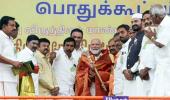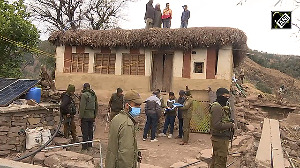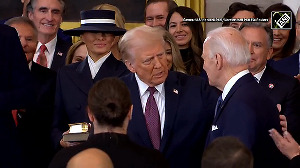No government in the past initiated the process of policy making for its next tenure even before going in for elections.
Once the Model Code of Conduct is enforced by the Election Commission, should the government of the day refrain from taking an active interest in policy making for the next five years and let that be the function of the new government?, asks A K Bhattacharya.

Members of India's fabled steel frame, or civil servants belonging to the Indian Administrative Service, have been experiencing something quite unusual this summer.
Lok Sabha elections have been announced. The Election Commission of India has enforced the Model Code of Conduct.
Yet, senior civil servants, who usually heave a sigh of relief from their routine work for a few weeks before a general election, are under even greater pressure to work overtime.
In the past, most bureaucrats, apart from those entrusted with election duties, would treat this pre-election period as an occasion for recharging their batteries through some relaxed work and training.
But that has not been their experience this time.
How different has 2024 been so far for civil servants?
The reality this year is that even those not on election duty have been burning the proverbial midnight oil to prepare an action plan for implementation by the government that would be formed in June 2024.
This is no ordinary action plan. It will contain measures and policies that the new government should take and implement during its five-year tenure. Not just that.
The plan should also include a series of steps that the government could take in the first 100 days of its fresh term. Why 100 days?
Presumably, the 100-day deadline is meant to induce a sense of the speed and focus with which the newly elected government would be implementing those decisions.
Or, perhaps, the idea is to recreate the excitement that the 100-day blitzkrieg of policy action taken by the P V Narasimha Rao government had created more than three decades ago!
Not that civil servants do not work in similar mission mode after general elections are called.
In 2009, for instance, the civil servants worked hard on how to rescue information-technology firm Satyam from financial fraud, to which its owner had confessed in January that year.
Civil servants in the finance ministry and the corporate affairs ministry spent many a sleepless night helping an independent committee of professionals to complete the process of finding a buyer for financially beleaguered Satyam and, as many would argue, to save the reputation of India's famed IT industry.
Indeed, a new buyer for Satyam was found in Tech Mahindra through an auction by April, much before the elections were concluded and a new government was in place.
There is, however, no such crisis or scandal that should have driven the Narendra Modi government into overdrive in 2024.
The urgency of work among civil servants has arisen from a different set of factors.
Mr Modi has already told voters that they should expect a series of new measures to counter corruption in the first few days of the formation of the new government.
There are also reports of the Modi government's decision to put this plan out in the public domain to ensure that everyone is aware of the new government's vision and road map to achieve its goals of making India a developed country by 2047.
Some news reports are talking about a renewed push for infrastructure building, while others are referring to economic policy reforms like notifying the four labour codes that were passed by Parliament a few years ago.
It would appear that the finance ministry has already begun internal preparations for the full Budget for 2024-2025 the new government would have to present after the elections.
Even the Reserve Bank of India was gently told by Mr Modi that it should engage in internal deliberations for the next few weeks, because soon after the formation of the new government, a series of steps would have to be taken.
Why do these initiatives appear to be unusual? They do appear unusual because no government in the past initiated the process of policy making for its next tenure even before going in for elections.
Not even Mr Modi attempted such an exercise before the general elections of 2019.
Clearly, this is an outcome of the ruling party's supreme confidence in its electoral prospects.
The formation of a government led by the Bharatiya Janata Party in June 2024 is a foregone conclusion that even Opposition parties do not question.
So, the government is not losing any time in finalising its 2024-2029 action plan during the pre-election days.
But two sets of questions arise over these initiatives.
The first set is about the convention a government should follow.
It is the same convention that obliges a government to present only five full Budgets in its five-year tenure.
That's why last February the finance minister presented only an Interim Budget and not a full Budget despite its belief even then that the BJP would return to power after the elections.
Thus, if there is no emergency situation, can a government in the run-up to the elections ask the civil servants to prepare an action plan that it wants to implement once it gets re-elected?
Should there be a pause in government planning or decision making once elections are called, provided there is no crisis to handle?
The second set of questions pertains to how the Election Commission should view such policy plans being prepared by the civil servants.
The key question here is whether there is a change in the character of the government when the Election Commission notifies the election schedule.
Once the Model Code of Conduct is enforced by the Election Commission, should the government of the day refrain from taking an active interest in policy making for the next five years and let that be the function of the new government?
There is yet another sensitive issue. It is only natural that if central ministries are asked to prepare their action plans for the next five years, some of those details may come out in the public domain even while elections are being held.
Doesn't the ruling party, therefore, enjoy an advantage over the other contesting parties, which can rely only on their election manifestos?
Isn't that why the RBI sought in 2014 permission from the Election Commission before announcing the names of those who would be granted bank licences?
Of course, most of these questions are in the grey area.
But they do trigger thoughts about the fine distinction between the letter and spirit of governance and the electoral code of conduct.
And a debate over such issues can only strengthen India's democracy and its institutions.
Feature Presentation: Aslam Hunani/Rediff.com












 © 2025
© 2025